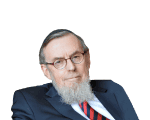“We have a maximum of choices and a minimum of meaning.” Lord Rabbi Jonathan Sacks z”l
The Upcoming Post-Corona Crisis, Part 2
As mentioned in my last essay it seems that the average religious and secular communities suffer from the same problem: the lack of a deeper existential, transcendental meaning. This is true as much for the Jewish community as for the non-Jewish world.
This is what makes these communities unhappy and dissatisfied with their lives, which in severe circumstances – such as during Covid-19 – leads to much unrest and violence.
Not only are our lives under threat, but our financial stability has been badly undermined. Also, the education of our children has been disrupted, which may affect them seriously in ways we cannot yet predict and could be detrimental to them for the rest of their lives. And there is so much more at stake. These matters are highly worrisome.
In fact, all this will certainly bring upon humankind a new world order that will shock many of us. We may think that once a vaccine will put an end to the virus we’ll be able to go back to our old ways, but we will surely discover that nothing is further from the truth.
It will explode in our faces, because the virus has forced us to confront the most elementary questions concerning life and death. It provokes us to ask the question of why we really want to live and why we will do anything to make this happen, while we all know that life is sometimes extremely painful and perhaps not worth living.
The renowned French author and philosopher Albert Camus depicted this in his famous statement: “There is but one truly serious philosophical problem and that is suicide” (The Myth of Sisyphus, 1942). Indeed, this question must be asked. Why not prefer death to life, so as not to have to live with pain. To argue that it would mean losing out on the many beautiful parts of life is not really convincing. After all, we wouldn’t know what we’re missing, so there’s nothing we would lack. But how many human beings are lucky enough not to be born? So why not opt for suicide? Nevertheless, we all want to live! We therefore will have to ask the question: Why?
While this question has always been in our subconscious, it is Covid-19 that has suddenly brought it to the surface as never before. Denying this question becomes more and more difficult. In fact, it becomes dangerous, since it constitutes a form of denial that can have disastrous consequences.
As mentioned in my earlier essay, Covid-19 is not the problem. The devastating result of this virus is only a symptom of a much larger ongoing problem, which is related to the way we have been conducting our lives on a micro and macro level during the last millennia.
This virus was able to do its devastating work because we got our priorities wrong.
We have been guilty of utilitarian thinking, in which we’ve made science, technology and the marketplace the ultimate concerns of our lives, and we have refused to deal with the major issue on which our future depends: the significance and purpose of our lives. However important science, technology and the marketplace may be, they have more to do with power and the functional side of our lives, and little to do with the meaning of our lives. If they are not kept under control, then something like Covid-19 can run wild, since there are no boundaries to stop it.
Abraham Joshua Heschel responded to Camus’ observation with the following words: “May I differ and suggest that there is only one really serious problem (…) Is there anything worth dying for?” (Who Is Man, p. 92) Indeed, this question is the very basis of our lives.
Science, technology and the marketplace lack the capacity to give us insight in the meaning and existential purpose of our lives, because they deal with the external side of our existence, not with its essence. True, they offer us more and more choices for how to handle our lives, but they cannot tell us which choices to make. They cannot teach us what is moral and what is not, what is right and what is wrong, or why we need and want to live. They can tell us how things happen but are completely incapable of telling us why these things happen and what value they have for making life worthwhile living.
The most important issue in the life of human beings is the question of existential meaning. Human beings are, by definition, meaning searching animals.
And this is the reason why we want to live despite everything. Something tells us that it is of infinite value, although we may not know what its meaning is. “To live is like love – all reason is against it, and all healthy instinct for it.”, said Samuel Butler, (“Higgledy-Piggledy”, Notebooks, 1912). And, paradoxically it is its un-knowableness which gives it even more value because it reminds us that there is more to life than we ever will be able to grasp. We hear a perpetual murmur coming from the waves of another realm which is ineffable.
As long as human beings believe that there is a profound purpose to their lives, they will be able to be happy and satisfied. As such, they can stand up against almost any obstacle, as Victor Frankel has shown us in his famous work Man in Search of Meaning, based on his experience in the deathcamps during the Holocaust. The same is true about the late psychiatrist Eric Fromm, who explains in his remarkable book To Have or to Be that much of the malaise in this world is due to the fact that to “have” much became an obsession and the ultimate goal, whereas to “be and become” much, in the spiritual sense, was put aside and declared to be of little importance.
Consequently, we became existential orphans. After all, if you only have the how and not the why, matters will ultimately fall apart, because the most significant aspect of human beings is ignored and laughed at.
The tragedy is that for hundreds of years the why questions have been demolished and replaced by how questions. Science took the place of spirituality and religious insights. By doing so, it robbed people of their most important goals and needs: that which surpasses the external side of life and gives human beings transcendental meaning.
The tremendous tragedy with religion is that once it was replaced with matters related to the external side of life, it adopted the very notion to which it always objected. It made the mistake of becoming utilitarian itself, thinking that by doing so, it would be more popular and rescue itself from the hands of the secularism, while in fact it fell victim to it. Religion became a behavioral discipline that wanted to represent the spiritual and the transcendental meaning of human beings by adopting its antitheses.
Religion turned into a remnant of a bygone living reality. It thought that once it would adopt definitions, (halachic) codes and catechisms, it would stay alive and provide meaning, with new oxygen to seeking human beings. But in fact it suffocated them, because faith can only stay alive and grow when it finds itself in its natural habitat, in which the Divine stands at the center of human existence and reaches to the sum total of human beings, which is far more than their intellect or scientific knowledge. It includes emotions, thoughts, beliefs, and so much more, which will cause the human being to tremble.
This problem has by now entered the Jewish and non-Jewish religious world and their educational institutions, including the synagogue and the church. Most of them no longer provide us with a way through which we can experience such an exalted form of existence. And they therefore became nearly meaningless for the searching human being.
Secular ideologies made the same mistake. While some of them offer deep insights, they are unable to provide their followers with a vision of how to live with these insights on a practical level. They provided us with the art of comprehending, but not with the art of revering and living in deep reverence for life, which can only be accomplished through a type of lifestyle that is rooted in saintly deeds and rituals, which will touch on the very meaning of life.
In other words, what religion has too much of, secular ideologies have too little of. One got stuck in so much formalism that it could no longer breathe, while the other adopted an approach that left human beings without guidelines on how to deal with a constantly increasing amount of opportunities, which make it impossible to get a grip on life, leaving human beings in nowhere land. Both of them are incapable of providing the religious and secular human being with the objective that the individual longs for the most: transcendental meaning. And to live accordingly.
Now that we have somewhat analyzed the problem, we must ask how to turn the tide. Hopefully, we’ll be able to discuss this in our next essay of this series.
This publication was made possible by the support of the Louis and Dina van de Kamp Foundation. August, 2020.




